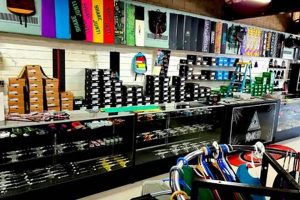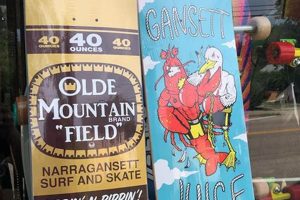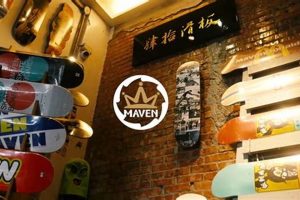A retail establishment specializing in equipment and apparel for skateboarding, often serving as a hub for local skateboarding communities. These businesses typically offer a range of products including skateboards, trucks, wheels, bearings, shoes, and protective gear. Services may extend to board customization, repair, and expert advice for skaters of all skill levels.
Such an enterprise plays a crucial role in fostering the skateboarding culture within a region. Benefits include providing access to specialized equipment, supporting local skaters and events, and offering a physical space for community interaction. Historically, these shops have evolved from simple retailers to important social centers, influencing trends and promoting the sport.
The following sections will delve deeper into the specific aspects of operating a successful retail business focused on skateboarding, including product selection, community engagement strategies, and the overall impact on the local skateboarding scene.
Guidance for Optimal Skateboard Selection and Maintenance
This section provides crucial advice for skateboarders seeking to maximize performance and longevity of their equipment. Adherence to these guidelines ensures a safer and more enjoyable skateboarding experience.
Tip 1: Deck Selection. Prioritize deck width based on foot size and skating style. Wider decks offer greater stability, advantageous for beginners and vert skaters. Narrower decks enhance maneuverability, preferred by street skaters.
Tip 2: Truck Assessment. Truck height should complement wheel size to prevent wheel bite. Proper truck tightness is vital; excessively tight trucks restrict turning, while overly loose trucks compromise stability.
Tip 3: Wheel Durometer Consideration. Lower durometer wheels (softer) provide better grip on rough surfaces, ideal for street skating. Higher durometer wheels (harder) offer greater speed and slide capability, suitable for skate parks.
Tip 4: Bearing Maintenance. Regular cleaning and lubrication of bearings are essential. Debris accumulation reduces speed and bearing lifespan. Specific bearing lubricants designed for skateboarding applications are recommended.
Tip 5: Hardware Inspection. Consistent checking and tightening of all nuts and bolts prevent equipment failure. Damaged or worn hardware must be replaced promptly.
Tip 6: Grip Tape Replacement. When grip tape loses its abrasiveness, replace it. Adequate grip is necessary for board control and execution of tricks.
Tip 7: Footwear Selection. Skate-specific shoes provide enhanced board feel and durability. Consider reinforced stitching and durable materials to withstand the wear and tear of skateboarding.
Following these recommendations will enhance both the performance and lifespan of skateboarding equipment. This contributes to a safer and more enjoyable skateboarding experience.
The concluding section will summarize the benefits of a well-maintained and carefully selected skateboard setup for skaters of all skill levels.
1. Community Engagement
Community engagement represents a critical component in the sustained viability and success of a skateboarding retail establishment. Its effect manifests in heightened brand loyalty, increased customer traffic, and the cultivation of a positive reputation within the local skateboarding scene. A skate shop that actively engages with its community transcends the role of a mere retail outlet; it becomes a focal point for social interaction, skill development, and the promotion of skateboarding culture.
Examples of effective community engagement include sponsoring local skateboarding events, such as competitions and demonstrations. Organizing workshops and lessons caters to both novice and experienced skaters, fostering skill development and creating opportunities for mentorship. Collaborating with local artists and designers on limited-edition products reinforces the shop’s connection to the community’s unique identity. Additionally, actively participating in community service initiatives, such as park clean-ups or skateboarding safety campaigns, further strengthens the shop’s position as a responsible and contributing member of the local area.
Ultimately, prioritizing community engagement enables a skateboarding retail business to forge meaningful relationships with its clientele, transforming customers into advocates. This approach, while demanding consistent effort and genuine commitment, yields significant long-term benefits, ensuring the shop’s resilience and relevance within the ever-evolving skateboarding landscape. Ignoring community engagement risks marginalization and decreased competitiveness, highlighting its indispensable role in the success of skateboarding retail operations.
2. Product Diversification
Product diversification, a fundamental aspect of a successful skateboard retail business, directly impacts revenue generation and customer retention. A limited product range restricts appeal, potentially diverting customers to competitors with broader inventories. In contrast, a diversified inventory attracts a wider demographic and caters to varied skateboarding preferences and skill levels. Example: A shop offering only standard skateboards neglects potential sales of longboards, cruisers, and electric skateboards, thereby missing opportunities to serve alternative skateboarding disciplines. The practical significance lies in maximizing sales potential and establishing a business as a comprehensive resource for all skateboarding needs.
Effective product diversification extends beyond core skateboarding hardware. Apparel, protective gear, accessories (such as stickers and tools), and even related merchandise (like skateboarding videos or books) contribute to a more immersive shopping experience. This approach encourages impulse purchases and increases average transaction value. Furthermore, offering products tailored to different price points allows the shop to accommodate budget-conscious customers while simultaneously catering to high-end enthusiasts. Example: Stocking both entry-level completes and high-performance, customizable setups broadens the customer base.
Implementing a successful diversification strategy requires ongoing market research and adaptation. Monitoring skateboarding trends, identifying emerging product categories, and soliciting customer feedback are essential for maintaining a relevant and competitive inventory. While diversification presents opportunities for growth, it also necessitates careful inventory management and storage to avoid overstocking and associated financial risks. In summary, strategic product diversification is crucial for sustained success, requiring continuous assessment and adjustment to meet the evolving needs of the skateboarding community.
3. Expert Staff
The expertise of the staff directly influences customer satisfaction and the reputation of the retail establishment. Knowledgeable employees can provide informed advice, ensuring customers make suitable purchase decisions. Within the context of a skateboarding retail environment, expert staff members contribute significantly to building trust and fostering a loyal customer base.
- Product Knowledge
A comprehensive understanding of skateboard hardware, apparel, and accessories is paramount. Staff members must be capable of differentiating between various products, explaining their features and benefits, and recommending optimal choices based on a customer’s skill level and skateboarding style. For example, an employee should be able to explain the difference between various truck brands, wheel durometers, and bearing types, advising customers on the optimal combination for their specific needs. This expertise enhances the customer experience and encourages informed purchasing decisions.
- Technical Skills
Proficiency in skateboard assembly, maintenance, and repair is highly valuable. Staff members who can competently assemble a skateboard, replace bearings, adjust trucks, and perform basic repairs instill confidence in customers. Offering services such as grip tape application or bearing cleaning further enhances the shop’s value proposition. The ability to address technical issues and provide practical solutions distinguishes the shop from generic retailers and reinforces its position as a skateboarding specialist.
- Skateboarding Experience
Personal experience in skateboarding provides staff members with a unique perspective and enhances their credibility. Employees who are active skaters can relate to customer needs and provide firsthand advice based on their own experiences. They can demonstrate skateboarding techniques, offer tips on trick execution, and share insights into local skateboarding spots. This shared passion fosters a sense of community and strengthens the bond between the shop and its customers.
- Customer Service
Exceptional customer service skills are crucial for creating a positive shopping experience. Staff members should be approachable, patient, and willing to assist customers with their inquiries. Active listening, clear communication, and a genuine interest in helping customers find the right products contribute to customer satisfaction and loyalty. Effective conflict resolution skills are also essential for addressing customer complaints and maintaining a positive atmosphere within the shop.
The presence of knowledgeable and experienced staff is a significant differentiator for any skateboard retail operation. Investment in staff training and development is essential for ensuring that employees possess the skills and expertise necessary to provide exceptional customer service and solidify the shop’s reputation as a trusted resource within the skateboarding community.
4. Strategic Location
Strategic location significantly influences the accessibility, visibility, and overall success of a retail establishment. For a skateboarding-focused business, optimal placement maximizes exposure to the target demographic and facilitates engagement with the local skateboarding community.
- Proximity to Skate Parks and Skate Spots
Locating near skate parks, popular street skateboarding areas, or other skateboarding-related venues directly enhances a shop’s visibility to its core customer base. Skaters frequenting these locations are more likely to discover and patronize a nearby shop offering essential equipment and supplies. Such proximity fosters convenience and encourages spontaneous purchases. For example, a shop situated adjacent to a well-known skate park benefits from consistent foot traffic generated by skaters regularly visiting the park.
- Accessibility and Visibility
Ease of access, via public transportation, pedestrian routes, or ample parking, is crucial for attracting customers. A location with high visibility from main roads or pedestrian thoroughfares ensures maximum exposure. Obscure or difficult-to-reach locations can significantly impede customer traffic, regardless of the quality of products or services offered. An easily accessible and visible shop benefits from increased impulse purchases and a broader customer base.
- Demographic Considerations
Analyzing the demographic composition of potential locations is essential. Identifying areas with a high concentration of young people, active lifestyles, and a demonstrated interest in skateboarding increases the likelihood of success. Market research can reveal valuable insights into the local skateboarding scene, including preferred brands, popular skateboarding styles, and demographic trends. Positioning a shop in an area aligned with these demographics maximizes its potential customer base.
- Competition and Complementary Businesses
Assessing the competitive landscape is crucial. Locating too close to established skateboarding shops can result in intense competition, potentially diminishing market share. Conversely, proximity to complementary businesses, such as sporting goods stores, apparel retailers, or youth-oriented establishments, can generate synergistic effects, driving additional foot traffic to the area. Careful evaluation of the competitive environment and the potential for collaboration is essential.
The strategic selection of a physical location is a pivotal decision for any business specializing in skateboarding retail. Prioritizing proximity to skateboarding hotspots, ensuring accessibility and visibility, considering demographic factors, and analyzing the competitive landscape collectively contribute to maximizing customer traffic, building brand awareness, and fostering long-term success within the local skateboarding community.
5. Online Presence
An effective online presence is a critical component for modern retail businesses, including establishments specializing in skateboarding equipment and apparel. It extends market reach, enhances brand visibility, and facilitates direct engagement with consumers.
- E-Commerce Functionality
The integration of e-commerce capabilities allows a skateboarding retail operation to transcend geographical limitations. By offering products for sale through an online platform, the business can reach customers beyond its local vicinity, expanding its market base and increasing revenue potential. This functionality necessitates secure payment processing, efficient order fulfillment, and reliable shipping logistics. A well-designed e-commerce platform provides detailed product descriptions, high-quality images, and customer reviews to facilitate informed purchasing decisions.
- Social Media Engagement
Active participation on social media platforms provides a direct channel for communicating with customers and promoting brand awareness. Content strategy should encompass product announcements, skateboarding-related news, event coverage, and user-generated content. Consistent engagement, through responding to comments and messages, fosters a sense of community and strengthens customer loyalty. Social media also serves as a valuable tool for gathering customer feedback and identifying emerging trends within the skateboarding landscape.
- Search Engine Optimization (SEO)
Implementing effective SEO strategies is crucial for ensuring that the business’s website ranks prominently in search engine results. This involves optimizing website content with relevant keywords, building high-quality backlinks, and ensuring a mobile-friendly user experience. Strong SEO performance increases organic traffic to the website, driving potential customers to the online store. Effective keyword research and content optimization are essential for maximizing visibility in search engine rankings.
- Online Advertising
Strategic online advertising campaigns can effectively target specific demographics and interests, driving targeted traffic to the business’s website. Platforms such as Google Ads and social media advertising allow for precise targeting based on factors such as age, location, interests, and online behavior. Well-crafted advertisements, featuring compelling visuals and persuasive messaging, can effectively capture the attention of potential customers and encourage them to visit the online store. A/B testing different ad variations can optimize campaign performance and maximize return on investment.
The establishment of a robust online presence is no longer optional but essential for sustained success in the competitive retail landscape. By leveraging e-commerce functionality, social media engagement, SEO strategies, and online advertising, a skateboarding-focused business can effectively reach a wider audience, build brand loyalty, and drive sales growth. This interconnected approach fosters a synergistic relationship between the physical store and its digital counterpart, maximizing overall business performance.
6. Brand Partnerships
Brand partnerships represent a strategic avenue for retail establishments to enhance product offerings, augment brand recognition, and cultivate customer loyalty. For skateboarding retailers, these collaborations extend beyond mere transactional relationships, fostering mutually beneficial synergies that resonate with the skateboarding community.
- Enhanced Product Offerings
Collaborating with established skateboard brands provides access to exclusive or limited-edition products. These offerings can include co-branded skateboards, apparel, and accessories, generating excitement and driving customer traffic. Partnerships can also facilitate access to specialized product lines, such as pro-model boards or signature footwear, catering to specific customer segments. This access to unique merchandise differentiates the retailer from competitors and enhances its perceived value.
- Amplified Brand Recognition
Alignment with reputable brands within the skateboarding industry amplifies a retailer’s visibility and credibility. Co-marketing initiatives, such as joint advertising campaigns or sponsored events, leverage the brand equity of partner companies to reach a wider audience. This cross-promotion enhances brand awareness and positions the retailer as a trusted source for authentic skateboarding products. Furthermore, association with respected brands can attract new customers who are already familiar with the partner’s products.
- Cultivated Customer Loyalty
Brand partnerships can facilitate customer loyalty programs and exclusive promotions. Offering discounts on partner products, organizing exclusive events featuring brand representatives, or providing early access to new releases incentivizes repeat purchases and strengthens customer relationships. These initiatives create a sense of community and exclusivity, fostering loyalty among skateboarding enthusiasts. Furthermore, aligning with brands that share the retailer’s values reinforces its commitment to the skateboarding lifestyle.
- Access to Industry Expertise
Collaboration with established brands provides access to valuable industry knowledge and technical expertise. Partner companies can offer training programs for retail staff, providing them with in-depth product knowledge and technical skills. This expertise enables the retailer to offer superior customer service and build trust with customers seeking informed purchasing decisions. Furthermore, access to industry insights facilitates informed inventory management and product selection.
Strategic brand partnerships serve as a cornerstone for successful skateboarding retail operations. These alliances not only enhance product offerings and augment brand recognition but also cultivate customer loyalty and provide access to industry expertise. By carefully selecting partners who align with its values and target demographic, a skateboarding retailer can create mutually beneficial relationships that contribute to its long-term success and strengthen its position within the skateboarding community.
Frequently Asked Questions
This section addresses common inquiries regarding Magnolia Skate Shop, aiming to provide clarity and comprehensive information.
Question 1: What methods of payment are accepted?
Magnolia Skate Shop accepts cash, Visa, Mastercard, American Express, and Discover credit and debit cards. Digital payment options such as Apple Pay and Google Pay are also accommodated.
Question 2: Does Magnolia Skate Shop offer skateboard repair services?
Yes, a range of repair services are available. These services include bearing replacement, grip tape application, truck mounting, and complete skateboard assembly. Complex repairs may require extended turnaround times.
Question 3: What is the return policy for purchased items?
Unused merchandise, accompanied by the original receipt, may be returned within 14 days of purchase for a full refund. Worn or damaged items are ineligible for return. Defective merchandise is subject to inspection and may be eligible for replacement or store credit.
Question 4: Does Magnolia Skate Shop offer skateboard lessons or workshops?
Periodically, introductory skateboarding workshops are offered. Schedules are announced via the website and social media channels. Private lessons are not currently provided.
Question 5: Are gift cards available for purchase?
Yes, physical gift cards can be purchased in-store in various denominations. Digital gift cards are not currently available.
Question 6: Does Magnolia Skate Shop sponsor local skateboarders or events?
Sponsorship opportunities are considered on a case-by-case basis. Interested individuals or organizations may submit a sponsorship proposal outlining their qualifications and proposed activities.
This FAQ section provides fundamental information about Magnolia Skate Shop’s operations and services.
The following segment will present customer testimonials and reviews, providing further insights into the shop’s reputation and customer satisfaction.
Conclusion
This exploration has underscored the multi-faceted nature of a successful skateboarding retail business. Beyond simply providing equipment, these establishments serve as community hubs, requiring a strategic approach to product selection, customer engagement, and overall business operations. Elements such as expert staff, a strong online presence, and valuable brand partnerships collectively contribute to sustained viability.
The future success of magnolia skate shop and similar ventures hinges on adaptability and a continued commitment to serving the evolving needs of the skateboarding community. A proactive approach to market trends, coupled with a dedication to fostering a positive and supportive environment, will determine its lasting impact and relevance within the local landscape.







